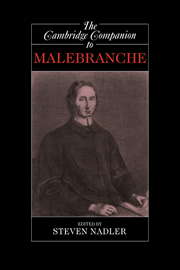Book contents
- Frontmatter
- Introduction
- 1 Malebranche and Method
- 2 Malebranche on the Soul
- 3 Malebranche on Ideas and the Vision in God
- 4 The Malebranche-Arnauld Debate
- 5 Malebranche on Causation
- 6 Metaphysics and Philosophy
- 7 Malebranche's Theodicy
- 8 Malebranche on Human Freedom
- 9 Malebranche's Moral Philosophy
- 10 The Critical Reception of Malebranche, from His Own Time to the End of the Eighteenth Century
- 11 Malebranche's Life and Legacy
- Bibliography
- Index
2 - Malebranche on the Soul
Published online by Cambridge University Press: 28 May 2006
- Frontmatter
- Introduction
- 1 Malebranche and Method
- 2 Malebranche on the Soul
- 3 Malebranche on Ideas and the Vision in God
- 4 The Malebranche-Arnauld Debate
- 5 Malebranche on Causation
- 6 Metaphysics and Philosophy
- 7 Malebranche's Theodicy
- 8 Malebranche on Human Freedom
- 9 Malebranche's Moral Philosophy
- 10 The Critical Reception of Malebranche, from His Own Time to the End of the Eighteenth Century
- 11 Malebranche's Life and Legacy
- Bibliography
- Index
Summary
Few periods are more important in the philosophy of mind than the seventeenth century. The new mechanical picture of the physical world confronted many philosophers with an exciting challenge,- they needed to formulate theories of the mind and its place in nature, which were not only more philosophically defensible but also better adapted to the needs of Christian theology than their traditional Aristotelian-Scholastic rivals. Although many of the theories that were advanced are widely rejected today, there is no doubt that they left a decisive mark on subsequent thinking; indeed, they helped to define the contemporary agenda in the philosophy of mind. For instance, current debates over the merits of dualism and materialism are often clearly of seventeenth-century inspiration. Other thinkers in the period may have had a more direct impact on modern philosophy of mind, but few, if any, are more interesting than Malebranche.
- Type
- Chapter
- Information
- The Cambridge Companion to Malebranche , pp. 31 - 58Publisher: Cambridge University PressPrint publication year: 2000
- 8
- Cited by

